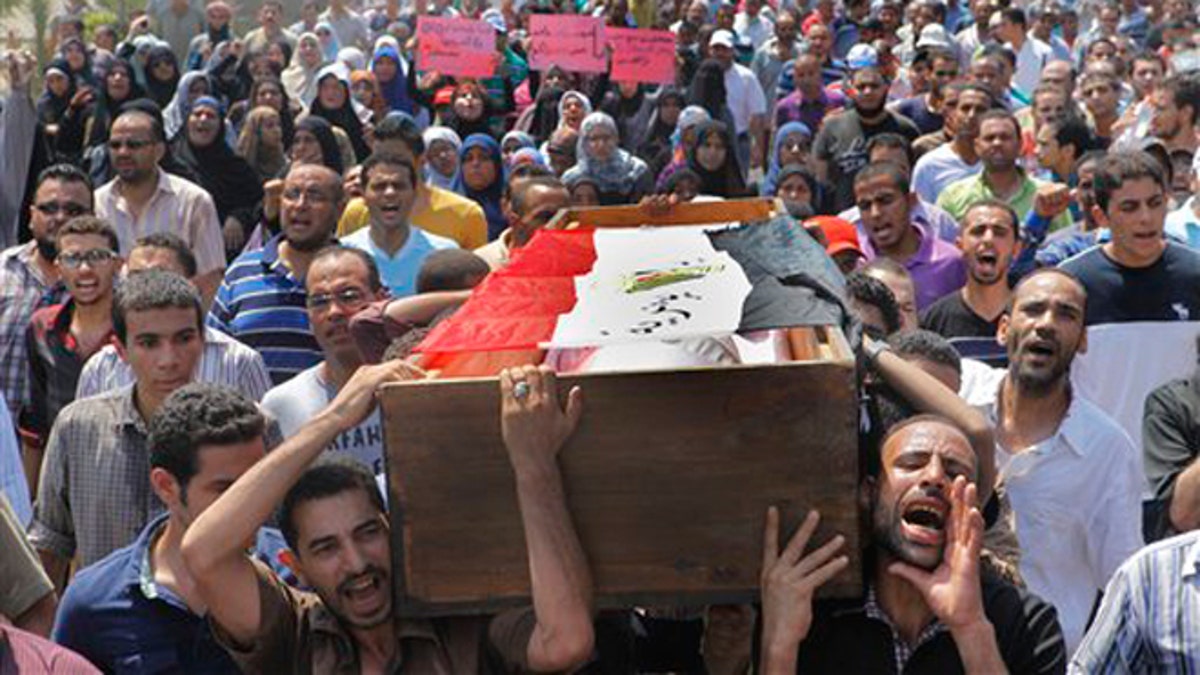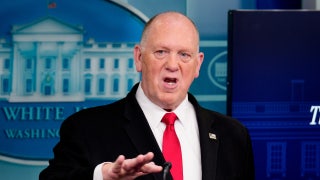
Aug. 16, 2013: Supporters of Egypt's ousted President Mohammed Morsi march towards Old Cairo as they carry the coffin, covered with a national flag, of their colleague who was killed during clashes on August 14 in Cairo, Egypt. (AP/Amr Nabil)
The bloodletting continues.
While the Egyptian government claims that around 650 people have been killed so far, correspondents suggest that fatalities have already exceeded 1,000. Here are five observations:
1. What we’re witnessing in Egypt stands in stark opposition to the most defining of American interests – the advance of human freedom.
If we’re to preach democracy as the emancipator of mankind, freedom requires our unbending defense. It cannot be left to rot in subjectivity -- a blessing only for those who meet our natural ideological approval. That is the path to a rank hypocrisy.
Recognizing this reality, our current policy in Egypt is unfit for the task.
President Obama seems unable to realize that American leadership will require more than carefully calibrated words. We lack credibility with Egyptians because our policy is devoid of conviction.
This must change.
The president must impose a new understanding upon the Egyptian military – a cognizance that painful consequences will follow their continued thuggery.
America’s reaction to the street grinding has, so far, been pathetic – the simple cancellation of Bright Star (a military exercise).
We need to bare our teeth. We must reduce our provision of financial aid to the generals -- offering the prospect of a renewal if they mollify their behavior and pursue national rapprochement.
2. Some commentators are suggesting that the answer to this crisis lies with the deployment of military liaison officers to Egypt. They claim that longstanding ties between U.S. and Egyptian militaries would allow U.S. officers to produce a tempering influence.
This is wishful thinking.
Yes, some senior U.S. military and Egyptian military officers have personal relationships. Yes, these relationships do, on occasion, have influence.
This being said, personal relationships won't be able to dissuade the generals away from those actions that they're determined to pursue.
The Egyptian senior officer corps already know that they're infuriating the U.S. government.Nevertheless, they're persisting upon their present course.
This tells us something -- American military officers are not going to be able to stop the crackdown.
As noted in my first point, in the end, only resolute U.S. government action can influence what the Egyptian military does and does not do.
3. The Muslim Brotherhood shares some responsibility for the continuing bloodshed. For one major example, many churches have been attacked by Brotherhood supporters.
Again, there's a sustaining truth in the various faces of this chaos. Different political extremists are targeting innocent civilians as they seek to implement their competing agendas.
Our condemnations and flowing responses must be matched to every atrocity. Not just against those which immediately reach the western news.
4. The Egyptian emergency is incorporating an increasingly sectarian-existential nature. Just as the Brotherhood continues to take to the streets against the government, opposing movements are forming vigilante groups.
As Shadi Hamid explains, the Brotherhood is highly unlikely to submit in quiet acquiescence.
If sectarian battles continue to erupt, the consequences are likely to be catastrophic.
At their defining level, hostile sectarian politics are vested in emotional hatreds rather than logical political agendas. The more they exacerbate, the greater the risks of bloodshed become. Just look at what happened in Iraq during late 2006.
5. I fear that this crisis may usher the arrival of a 'Salafist Spring.'
Inside Egypt and beyond its borders, many will regard the on-going military action as proof that their political ambitions are unattainable through peaceful, democratic engagement.
In short, they'll believe that democracy is the preserve of secular elites. This presents us with a major challenge.
For a start, democratic rejectionism merges perfectly with traditional Sunni extremist considerations of democracy -- as an intrinsically immoral undertaking.
As a result, Egyptian terrorist groups like the Egyptian Islamic Jihad (united with Al Qaeda) and the GaI/Islamic Group are likely to prosper from a well of new recruits (in the case of the GaI, political moderation is likely to slow dramatically or halt).
The Brotherhood may become the new moderates.
Unfortunately, this is only one side of the problem.
Across the region, Salafi jihadist groups are growing in strength. In Iraq, The Islamic State of Iraq and Syria (ISIS) is taking advantage of Sunni disaffection with the government of Prime Minister Maliki.
As we witnessed Thursday in Beirut, in Lebanon and Syria, other Sunni extremist organizations are flourishing amidst anger at Hezbollah’s sectarian brutality. But even as they incubate in local grievances, wherever their particular groups are located, Salafi extremist leaders have a shared and overriding objective – the establishment of a supranational Islamic caliphate.
In essence, a movement unencumbered by the notion of national borders and propelled by a unifying agenda. Galvanized by the footage from Egypt, increasingly energized Salafi extremism is likely to follow. Taking ISIS as a template, we should expect a security nightmare.
To mitigate this threat, the Obama administration must spare no effort in helping to cajole, nudge and if necessary, push Egypt onto a path of reconciliation.
Unless and until all Egyptians feel they have a democratically vested stake in their futures, the prospects for a just and durable peace will remain subordinated to the fire.








































